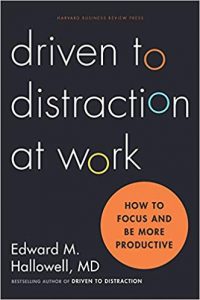Dr. Hallowell’s Memoir
Today marks the release of my memoir, Because I Come from a Crazy Family: The Making of a Psychiatrist. It’s unlike any book I’ve written before, this one only tells stories, true stories from my childhood and my early training in psychiatry. I introduce you to the great array of eccentric, wonderful, colorful and yes, sometimes crazy people who populated my life.
Growing up I didn’t know we were any different from other families. I thought the zaniness that surrounded me was just the way life was. Everyone was very loving, often very funny, usually unpredictable, and most of the time a lot of fun. This memoir is a celebration of craziness, my way of expressing my pride in my family in all our differences, craziness included.
Ending the Stigma of Mental Illness
It’s time to blast away the stigma that has plagued mental illness for thousands of years. The fact is, many, if not most people of exceptional talent struggle with one or another of the most commonly diagnosed mental illnesses:
- depression,
- anxiety disorders,
- substance use disorders,
- attention deficit hyperactivity disorder,
- post traumatic stress disorder,
- bi-polar disorder,
- reading disorders, or
- various personality disorders.
Yet they don’t seek help because they fear the shame and stigma that comes with the diagnosis.
However, I see these conditions as markers of talent. When I diagnose someone, I tell them we are embarking on a process of unwrapping their gifts. The mental illness can completely bury the talent so that it cannot emerge, or it can conceal it so that it can only partially emerge. My job as a psychiatrist is not just to treat the illness but just as important to develop the talent, to encourage the growth of the healthy part of the person.
One reason I wrote my new book was to show personally, through characters in my own family, how talent and mental illness can appear in the same person and how lack of treatment can bring a person down. Furthermore, I wanted to show how proper treatment can save a person altogether; and how wonderfully freeing it can be to live true to oneself with others who appreciate who you are for who you are without shame or recrimination.
The great gift my family gave me was just that: permission, indeed, insistence to be real. Our only real rule was don’t be a phony. And so in this new book I share with you all the true and wonderful characters I grew up with, and then the true and wonderful people who taught me psychiatry at the old Mass. Mental Health Center. The best teachers I ever had were the patients who let me take care of them. Like the people in my family, they could never be phony. Sometimes I couldn’t understand them, but I always new they were real and true.
So it gives me enormous pleasure to share with you all the gifts they gave to me through this memoir.
Order here
Watch Dr. Hallowell read the first chapter of his memoir HERE!
 The Surgeon General named loneliness as the #1 medical problem in the country. We live in a world characterized by what I call “the modern paradox”: miraculously connected electronically, we are growing disconnected interpersonally. This social isolation is as dangerous a risk factor for early death as cigarette-smoking, high blood pressure, and obesity. In this
The Surgeon General named loneliness as the #1 medical problem in the country. We live in a world characterized by what I call “the modern paradox”: miraculously connected electronically, we are growing disconnected interpersonally. This social isolation is as dangerous a risk factor for early death as cigarette-smoking, high blood pressure, and obesity. In this What is ADHD CollegeCORE Coaching and how can CollegeCORE Coaching help you?
What is ADHD CollegeCORE Coaching and how can CollegeCORE Coaching help you? If you’re having difficulty staying focused and feeling stuck at work, you can follow the 6 tips below, adapted from Dr. Hallowell’s book:
If you’re having difficulty staying focused and feeling stuck at work, you can follow the 6 tips below, adapted from Dr. Hallowell’s book:





